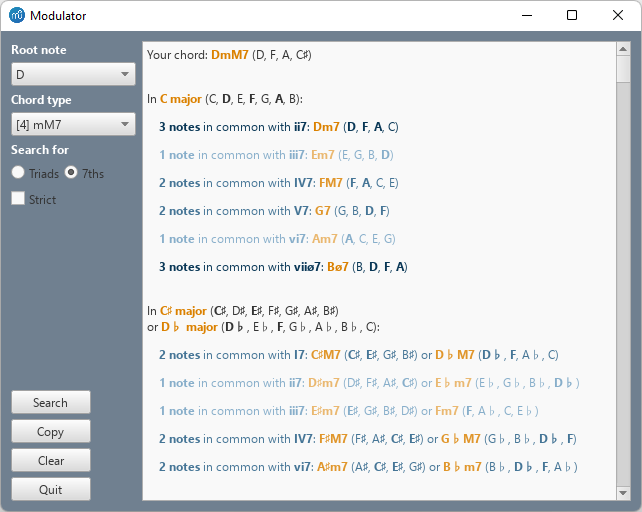Looking for Modulator for MuseScore 4 ? It's here.
Choose a single note or a chord, then let the plugin find all the chords (triads or seventh chords) in all keys and scales that share at least 1 note with it (see "Hints" below).
- Download the plugin as a .zip file (click on the green Code button at the top of this page, then on Download ZIP).
- Unzip it in the MuseScore3/Plugins folder (in Documents by default).
- Launch MuseScore.
- Enable Modulator in the Plugins > Plugin Manager... menu.
- Launch MuseScore.
- Open a score.
- Run Modulator from the Plugins > Composing Tools menu.
- Select the root note and type of the chord (or single note) you want to submit. Check Triads if you want to search for triads, or 7ths if you want to search for seventh chords. Check Strict if you want the results to include all the notes of your chord, uncheck if you want the results to include at least 1 note from your chord.
- Click on the Search button.
Tested on MuseScore 3.6.2.
Harmonizing a melody line
- Select one note from the melody you want to harmonize, select [1] single note as the chord type, check either Triads or 7ths (it doesn't matter whether you check or not Strict in case of a "single-note chord"), then press the Search button. You will be presented with all chords from all keys/scales that include the selected note. All those chords could be used to harmozize the selected note (and possibly modulate to a different key/scale in the process).
- For a 2-note counterpoint melody, select both notes as a 2-note chord (choosing the lowest as the root note), check either Triads or 7ths, check Strict, then press the Search button.
Pivot-chord modulation (see "Pivot-chord modulation" http://elliotthauser.com/openmusictheory/Modulation.html)
- To modulate using a pivot chord, select the root note and type of chord you want to use as a "pivot", check either Triads or 7ths, check Strict, then press the Search button. You will be presented with all chords from all keys/scales that share the selected notes. If you only want to consider, say, a subdominant function, sift through the results looking for a IV or iv (see "Extended Pivot Chord Modulation" below).
Common-tone modulation (see "Common-Tone Modulation" at https://viva.pressbooks.pub/openmusictheory/chapter/reinterpreting-augmented-sixth-chords/)
- To modulate using a common-tone, select the one note you want to keep in the original chord as a [1] single note type of chord, check either Triads or 7ths, then press the Search button. You will be presented with all chords from all keys/scales that share the selected note (e.g. "chromatic mediants").
Extended pivot-chord modulation via "mode mixture" (see "Chromatic Modulation" at https://viva.pressbooks.pub/openmusictheory/chapter/reinterpreting-augmented-sixth-chords/)
- For instance, let's say we start in A♭ major with a Fm chord (vi). Enter F as the root note and [3] m as the type of chord, check Triads and Strict, then press the Search button. Sift through the results to C natural minor which has the same Fm chord as (iv). Using Fm as a pivot chord, you could already modulate to C natural minor, but let's investigate its parallel key C major instead. C major is not listed as it doesn't include Fm, but if we run another Search with Strict unchecked, we find that C major has a closely related F chord (IV). Considering the keys of C major and C natural minor as a "mixture", we have found a way to modulate from A♭ major directly to C major, by using a F chord borrowed from C natural minor as a pivot chord.
We hope you will find many other uses for this plugin. Enjoy!



